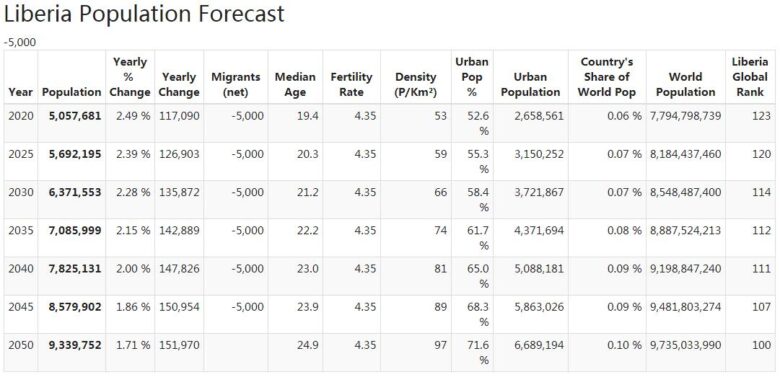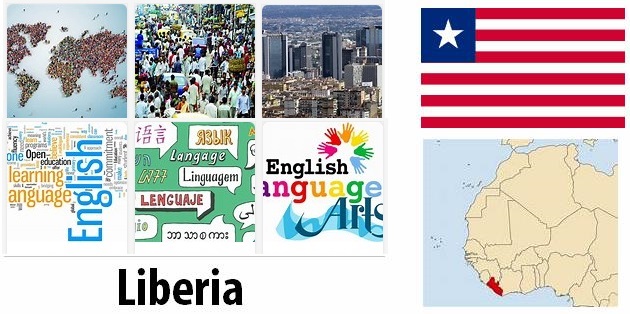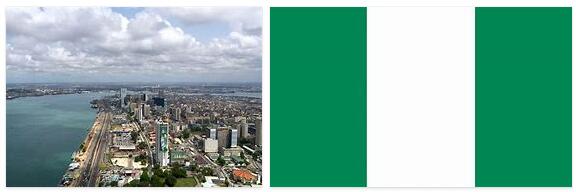Liberia Population and Language
In 2014, Liberia had just over four million residents. High birth rates cause the population to increase rapidly by almost three percent a year. The indigenous population consists almost entirely of 16 ethnic groups, of which kpelle and bass are the largest. A few percent of the residents are descendants of the liberated American slaves who founded the state of Liberia in 1847. These american liberians (in Liberia somewhat condescendingly called congo) had a monopoly of power until 1980, after which other peoples groups had greater influence.
Linguistically, the peoples can be divided into three major groups: man, kru (kwa) and western Atlantic people. Mandate languages are spoken in the country’s central and northern parts of, among others, kpelle, gio and mano. Krufolk (bass, grebo, kru, krahn) reside in the south. The western Atlantic peoples, of which the breeze is greatest, are in the border area to the north.
- COUNTRYAAH.COM: Key populations estimated size and data of Liberia, including population density of how many people per square mile. Also included are facts for population and language.
Prior to the first civil war of 1989-1996, some 30,000 Lebanese, Americans and Europeans lived in Liberia, but most left the country during the war. At the same time, almost half of the Liberian population was driven into flight, inside and outside the country; the capital Monrovia tripled its population. Further major migrations occurred in connection with the Second Civil War in the early 2000s. For a number of years, Liberia also received large streams of refugees from the war-torn neighboring countries of Sierra Leone and Ivory Coast. Almost all refugees from Sierra Leone have returned to their homeland. In 2010–2011, some 300,000 Ivorians fled to Liberia. Of these, just over 38,000 remained in the country in 2015. Social conditions).
Traditionally, Indigenous people have lived in consensus and marriages across ethnic boundaries have been commonplace. However, tensions arose between the locals and the American liberians who immigrated from the 19th century. However, ethnic differences first came to light after Samuel Do’s power in 1980 and later during the civil war of 1989-1996, when Krahn ended up in conflict with groups such as Gio and Mano. Market disputes between returning refugees sharpened the ethnic contradictions after the end of the war in 2003.
Until April 2006, more than 325,000 internally displaced persons were assisted to return to their homes, but in June 2015, according to UNHCR, there were nearly 14,000 Liberian refugees in other countries.
Up to a quarter of a million Liberians were killed during the civil war of 1989-1996 and in the early 2000s.
FACTS – POPULATION AND LANGUAGE
Population
kpelle 20%, bass 13%, grip 10%, gio 8%, mano 8%, the rest about 40% (census 2008)
Number of residents
4,731,906 (2017)
Number of residents per square kilometer
49 (2017)
Percentage of residents in the cities
50.7 percent (2017)
Nativity / birth
34.3 per 1000 residents (2016)
Mortality / mortality
7.9 per 1000 residents (2016)
POPULATION GROWTH
2.5 percent (2017)
fertility rate
4.6 number of births per woman (2016)
Percentage of women
49.5 percent (2017)
Life expectancy
63 years (2016)
Life expectancy for women
63 years (2016)
Life expectancy for men
62 years (2016)
Language
English is officially language 1
- about 20 local languages, most of which lack writtensources
2011
November
President Johnson Sirleaf wins the election
She is re-elected with over 90 percent of the vote in the second round since Tubman refused to stand with reference to alleged cheating in the first round. His call for a boycott has largely been heard by voters. The choice is preceded by violent unrest and threats against several media.
October
Johnson Sirleaf wins first round
She clearly wins over Winston Tubman in the first round of the presidential election but does not get an absolute majority. In the parliamentary elections, the presidential party UP is clearly the largest, but fails to reach its own majority.
Nobel Peace Prize to Liberia
It is awarded to President Ellen Johnson Sirleaf and peace activist Leymah Gbowee. A Yemeni human rights activist, Tawakul Karman, is also praised. The message from Oslo comes just days before the general elections and is criticized by the opposition.
August
Voting on new electoral laws
The CDC successfully propagates a boycott of a referendum to change the electoral law on several points. Only 34 percent of voters vote in the election and only one of the government’s four amendments is accepted.
May
Winston Tubman is named presidential candidate
The opposition party Congress for Democratic Change (CDC) elects Tubman, who is both economist and diplomat, as its presidential candidate.
January
Wrong to ban
The Supreme Court states that it would be a violation of the Constitution to ban people from public services without due process of law. Thus, the Truth and Reconciliation Commission is considered to have violated the constitutional freedoms of individuals (see also June 2009).




